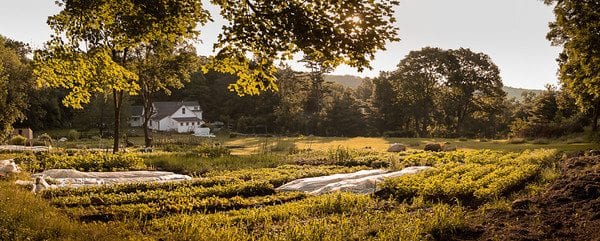Farming with Intent
By Garrison InstituteJocelyn Apicello is a local farmer who is trying to redefine who farmers are. She’s well-educated, with a Bachelor’s from Brown and a Doctorate from Columbia University, and she spends half her year farming her micro-farm in Phillipstown, New York. Longhaul Farm is the result of a conscious effort by Jocelyn and her partner, Jason Angell, to find a new way to incorporate “living well” and creating a community around an older place-based method of commerce.
In April, Jocelyn visited the Garrison Institute to speak with us about healthy food, nutrient density, soil cultivation, and the ecological stewardship of farmers. The goal of Longhaul Farm is not just to grow good food (although that’s certainly a consideration!) but rather to embody a conscientious and sustainable way of life. Everything that Longhaul Farm takes from the land, it strives to give back. This isn’t limited to just human sustainability with composting and energy return, but also includes an effort to ensure that the farm has the intrinsic natural materials it needs to survive and support the local fiscal economy.
Whatever a plant takes out of the soil needs to be put back. If a carrot absorbs a certain mineral, that mineral needs to be added back into the ground, either by tilling rock dust through the ground, or adding in a vitamin pill, or finding another way to balance out what the carrot took. Jocelyn asked us, “When is a carrot not a carrot?” If a vegetable is grown in the same soil year after year, with no upkeep or reintroduction of material into the ground, when does a carrot cease to serve the function of a carrot? When does it lose the nutritious essence of what it is meant to provide as a vegetable, and at what point does it become something that lacks the basic necessities that define a carrot.
The idea of a sustainable economy works much the same way. If someone lives in a town, they should purchase from the neighbors, and keep the wealth cyclical and intrinsic to the success of your own business.
This tenet is the cornerstone of Apicello’s work with the Ecological Citizen’s Project which works to build ecological citizenship by growing citizen-led campaigns to produce a more just, healthy, democratic and sustainable way-of-life.
The Project supports local systems and people by building networks and educating citizens. Interpersonal storytelling and connecting people is a huge part of their work. The goal is to create a more democratic lifestyle to create a sustainable and practical set of values to uplift entire communities.
Jocelyn also spoke about the way that farming and gardening can teach people to appreciate nature more. She volunteers at local prisons in the area, teaching incarcerated people how to garden and helping establish and run small food-producing plots inside the walls.
One young man who had spent a few months helping out in the garden in the local prison approached Jocelyn after a day tilling the soil. He said that he had a rough few days and had been going to bed angry and upset every night. Then, one night, it started to rain, and he forgot about all the problems he was having inside the prison, and instead strained to get a look outside, trying to see his garden. He said that all he felt in that moment was happiness and relief, because he knew how much the plants had needed the rain.
This is the kind of connection that Jocelyn, Longhaul Farm, and the Ecological Civilizations Project all strive to instill in each person–the innate connection to the earth, the understanding of the life cycles of all things, and the ways in which our communities can become fully sustainable and supportive.
